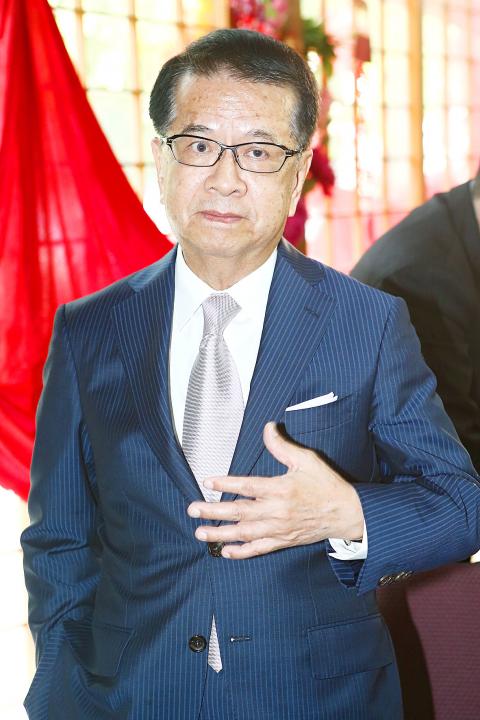Pxmart Co Ltd (全聯實業), which operates one of the nation’s largest supermarket chains, yesterday confirmed that company president Hsu Chung-jen (徐重仁) would retire in September.
Hsu — who has been in charge of Pxmart since 2014 — is to step down from the management team next month and officially retire by the end of September, the company said in a statement, citing personal career planning reasons.
Hsu, who has worked in the retail industry for more than 30 years, is also known for turning President Chain Store Corp (PCSC, 統一超商) into the nation’s largest convenience store chain operator, serving as its president prior to joining Pxmart.

Photo: Chen Yi-kuan, Taipei Times
Pxmart named CEO James Hsieh (謝健南) as president, saying he would lead its expansion plans.
Hsieh previously served as chief operating officer of PCSC and as CEO of Gourmet Master Co (美食達人), which operates popular cafe and bakery chain 85°C (85度C)
Hsu is stepping down because he and Pxmart chairman Lin Ming-hsiung (林敏雄) disagree about the company’s future plans, the Chinese-language Economic Daily News reported.
However, at a news conference yesterday, Hsieh denied the report, saying that Hsu had as early as last year decided to retire.
“The company’s long-term operations objective will not change, but we might take different measures [to achieve it],” Hsieh said.
Pxmart, which operates 910 outlets nationwide, said it aims to increase the number of its stores to 1,000 and boost annual sales from about NT$101 billion (US$3.33 billion) last year to more than NT$200 billion.
The company’s brand image has taken a beating since comments by Hsu about low salaries sparked a backlash among young people.
At a book launch in April, Hsu accused young people of “spending beyond their means on trips abroad and the latest mobile phones,” saying that the younger generation should endure low wages rather than complain.
He later apologized on Facebook after the company’s page was bombarded with irate messages from young people.
Pxmart last month apologized to film director Wu Nien-jen (吳念真), who complained on Facebook about the company’s use of his image in marketing materials without asking for his permission.

SEPARATE: The MAC rebutted Beijing’s claim that Taiwan is China’s province, asserting that UN Resolution 2758 neither mentions Taiwan nor grants the PRC authority over it The “status quo” of democratic Taiwan and autocratic China not belonging to each other has long been recognized by the international community, the Mainland Affairs Council (MAC) said yesterday in its rebuttal of Beijing’s claim that Taiwan can only be represented in the UN as “Taiwan, Province of China.” Chinese Minister of Foreign Affairs Wang Yi (王毅) yesterday at a news conference of the third session at the 14th National People’s Congress said that Taiwan can only be referred to as “Taiwan, Province of China” at the UN. Taiwan is an inseparable part of Chinese territory, which is not only history but

NATIONAL SECURITY: The Chinese influencer shared multiple videos on social media in which she claimed Taiwan is a part of China and supported its annexation Freedom of speech does not allow comments by Chinese residents in Taiwan that compromise national security or social stability, the nation’s top officials said yesterday, after the National Immigration Agency (NIA) revoked the residency permit of a Chinese influencer who published videos advocating China annexing Taiwan by force. Taiwan welcomes all foreigners to settle here and make families so long as they “love the land and people of Taiwan,” Premier Cho Jung-tai (卓榮泰) told lawmakers during a plenary session at the Legislative Yuan in Taipei. The public power of the government must be asserted when necessary and the Ministry of

CROSSED A LINE: While entertainers working in China have made pro-China statements before, this time it seriously affected the nation’s security and interests, a source said The Mainland Affairs Council (MAC) late on Saturday night condemned the comments of Taiwanese entertainers who reposted Chinese statements denigrating Taiwan’s sovereignty. The nation’s cross-strait affairs authority issued the statement after several Taiwanese entertainers, including Patty Hou (侯佩岑), Ouyang Nana (歐陽娜娜) and Michelle Chen (陳妍希), on Friday and Saturday shared on their respective Sina Weibo (微博) accounts a post by state broadcaster China Central Television. The post showed an image of a map of Taiwan along with the five stars of the Chinese flag, and the message: “Taiwan is never a country. It never was and never will be.” The post followed remarks

Proposed amendments would forbid the use of all personal electronic devices during school hours in high schools and below, starting from the next school year in August, the Ministry of Education said on Monday. The Regulations on the Use of Mobile Devices at Educational Facilities up to High Schools (高級中等以下學校校園行動載具使用原則) state that mobile devices — defined as mobile phones, laptops, tablets, smartwatches or other wearables — should be turned off at school. The changes would stipulate that use of such devices during class is forbidden, and the devices should be handed to a teacher or the school for safekeeping. The amendments also say